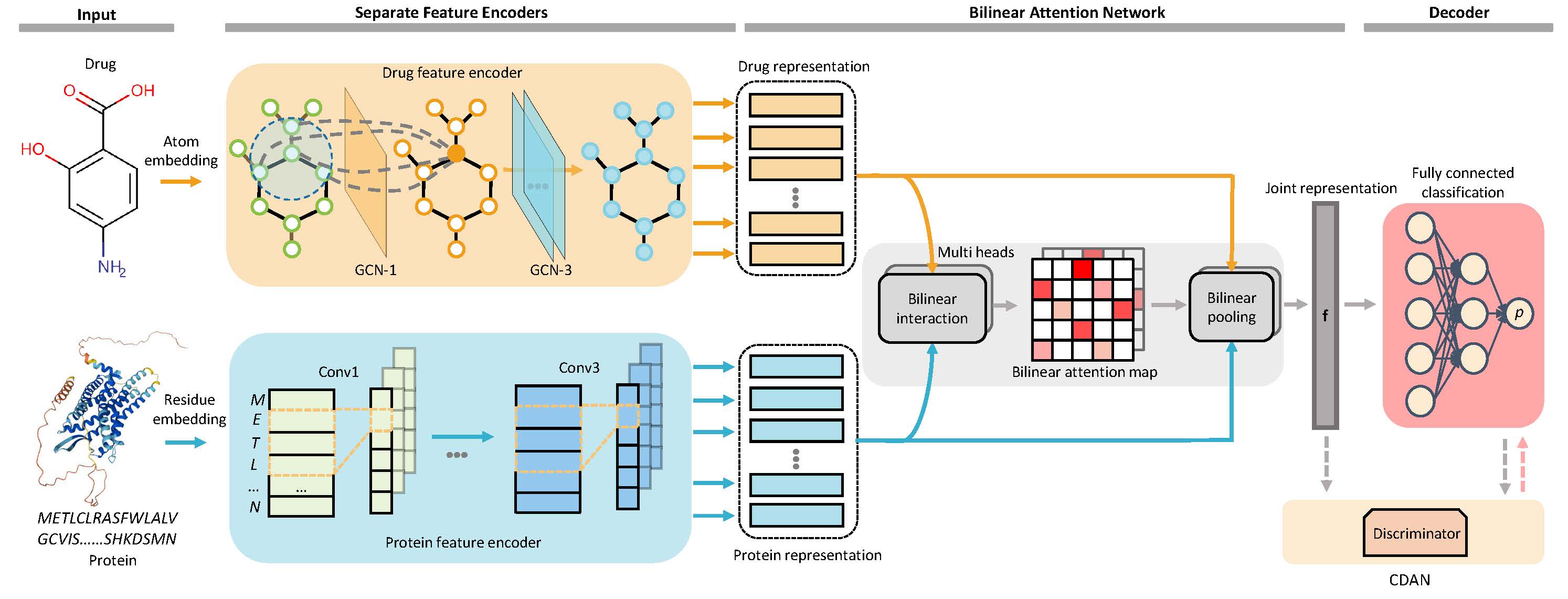Interpretable bilinear attention network with domain adaptation improves drug-target prediction | Paper
This repository contains the PyTorch implementation of DrugBAN framework, as described in our Nature Machine Intelligence paper "Interpretable bilinear attention network with domain adaptation improves drug–target prediction". DrugBAN is a deep bilinear attention network (BAN) framework with adversarial domain adaptation to explicitly learn pair-wise local interactions between drugs and targets, and adapt on out-of-distribution data. It works on two-dimensional (2D) drug molecular graphs and target protein sequences to perform prediction.
The source code developed in Python 3.8 using PyTorch 1.7.1. The required python dependencies are given below. DrugBAN is supported for any standard computer and operating system (Windows/macOS/Linux) with enough RAM to run. There is no additional non-standard hardware requirements.
torch>=1.7.1
dgl>=0.7.1
dgllife>=0.2.8
numpy>=1.20.2
scikit-learn>=0.24.2
pandas>=1.2.4
prettytable>=2.2.1
rdkit~=2021.03.2
yacs~=0.1.8
comet-ml~=3.23.1 # optional
Clone this Github repo and set up a new conda environment. It normally takes about 10 minutes to install on a normal desktop computer.
# create a new conda environment
$ conda create --name drugban python=3.8
$ conda activate drugban
# install requried python dependencies
$ conda install pytorch==1.7.1 torchvision==0.8.2 torchaudio==0.7.2 cudatoolkit=10.2 -c pytorch
$ conda install -c dglteam dgl-cuda10.2==0.7.1
$ conda install -c conda-forge rdkit==2021.03.2
$ pip install dgllife==0.2.8
$ pip install -U scikit-learn
$ pip install yacs
$ pip install prettytable
# clone the source code of DrugBAN
$ git clone https://github.com/pz-white/DrugBAN.git
$ cd DrugBAN
The datasets folder contains all experimental data used in DrugBAN: BindingDB [1], BioSNAP [2] and Human [3].
In datasets/bindingdb and datasets/biosnap folders, we have full data with two random and clustering-based splits for both in-domain and cross-domain experiments.
In datasets/human folder, there is full data with random split for the in-domain experiment, and with cold split to alleviate ligand bias.
We provide DrugBAN running demo through a cloud Jupyter notebook on . Note it is based on a small sample dataset of bindingdb due to the resource limitation of a free colab account. This demo only takes 3 minutes to complete the training and testing process. For running DrugBAN on the full dataset, we advise GPU ram >= 8GB and CPU ram >= 16GB.
The expected output and run time of demo has been provided in the colab notebook for verification.
To train DrugBAN, where we provide the basic configurations for all hyperparameters in config.py. For different in-domain and cross-domain tasks, the customized task configurations can be found in respective configs/*.yaml files.
For the in-domain experiments with vanilla DrugBAN, you can directly run the following command. ${dataset} could either be bindingdb, biosnap and human. ${split_task} could be random and cold.
$ python main.py --cfg "configs/DrugBAN.yaml" --data ${dataset} --split ${split_task}
For the cross-domain experiments with vanilla DrugBAN, you can directly run the following command. ${dataset} could beither bindingdb, biosnap.
$ python main.py --cfg "configs/DrugBAN_Non_DA.yaml" --data ${dataset} --split "cluster"
For the cross-domain experiments with CDAN DrugBAN, you can directly run the following command. ${dataset} could beither bindingdb, biosnap.
$ python main.py --cfg "configs/DrugBAN_DA.yaml" --data ${dataset} --split "cluster"
Comet ML is an online machine learning experimentation platform, which help researchers to track and monitor their ML experiments. We provide Comet ML support to easily monitor training process in our code. This is optional to use. If you want to apply, please follow:
-
Sign up Comet account and install its package using
pip3 install comet_ml. -
Save your generated API key into
.comet.configin your home directory, which can be found in your account setting. The saved file format is as follows:
[comet]
api_key=YOUR-API-KEY
- Set
_C.COMET.USEtoTrueand change_C.COMET.WORKSPACEinconfig.pyinto the one that you created on Comet.
For more details, please refer the official documentation.
This implementation is inspired and partially based on earlier works [2], [4] and [5].
Please cite our paper if you find our work useful in your own research.
@article{bai2023drugban,
title = {Interpretable bilinear attention network with domain adaptation improves drug-target prediction},
author = {Peizhen Bai and Filip Miljkovi{\'c} and Bino John and Haiping Lu},
journal = {Nature Machine Intelligence},
year = {2023},
publisher={Nature Publishing Group},
doi = {10.1038/s42256-022-00605-1}
}
[1] Liu, Tiqing, Yuhmei Lin, Xin Wen, Robert N. Jorissen, and Michael K. Gilson (2007). BindingDB: a web-accessible database of experimentally determined protein–ligand binding affinities. Nucleic acids research, 35(suppl_1), D198-D201.
[2] Huang, Kexin, Cao Xiao, Lucas M. Glass, and Jimeng Sun (2021). MolTrans: Molecular Interaction Transformer for drug–target interaction prediction. Bioinformatics, 37(6), 830-836.
[3] Chen, Lifan, et al (2020). TransformerCPI: improving compound–protein interaction prediction by sequence-based deep learning with self-attention mechanism and label reversal experiments. Bioinformatics, 36(16), 4406-4414.
[4] Kim, Jin-Hwa, Jaehyun Jun, and Byoung-Tak Zhang (2018). Bilinear attention networks. Advances in neural information processing systems, 31.
[5] Haiping Lu, Xianyuan Liu, Shuo Zhou, Robert Turner, Peizhen Bai, ... & Hao Xu (2022). PyKale: Knowledge-Aware Machine Learning from Multiple Sources in Python. In Proceedings of the 31st ACM International Conference on Information and Knowledge Management (CIKM).
